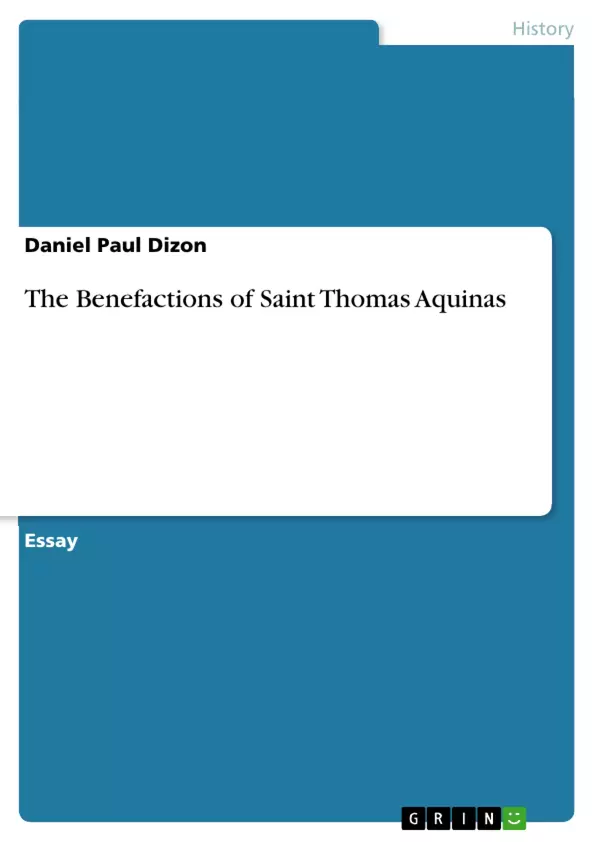A gift is a thing given willingly to someone without
payment. The adjoining definition of a gift is a natural ability or talent. A benefaction is a gift
or a contribution of an individual who possesses a historical significance because of the individual’s bestowals. Thomas Aquinas is the specific individual that this research will highlight. Saint Thomas Aquinas lived from 1225-1274.
Thomas Aquinas studied at Monte Cassino. However, little is known about his studies here. Aquinas later on moved to the University of Naples before finally
advancing to the University of Paris to complete his studies. Thomas Aquinas focused his studies in the arts of the trivium, and those of the quadrivium. Trivium is a Latin terminology meaning, “the three ways” comprised with the subjects grammar, rhetoric, and logic which were thought first. Following these subjects is the quadrivium, consisting of the arithmetic, geometry, music, and astronomy. These studies constituted the secular education that complemented sacred doctrine that came from the Bible.
A gift is a thing given willingly to someone without payment. The adjoining definition of a gift is a natural ability or talent. A benefaction is a gift or a contribution of an individual who possesses a historical significance because of the individual’s bestowals. Thomas Aquinas is the specific individual that this research will highlight. Saint Thomas Aquinas lived from 1225-1274.
Thomas Aquinas studied at Monte Cassino. However, little is known about his studies here. Aquinas later on moved to the University of Naples before finally advancing to the University of Paris to complete his studies. Thomas Aquinas focused his studies in the arts of the trivium, and those of the quadrivium. Trivium is a Latin terminology meaning, “the three ways” comprised with the subjects grammar, rhetoric, and logic which were thought first. Following these subjects is the quadrivium, consisting of the arithmetic, geometry, music, and astronomy. These studies constituted the secular education that complemented sacred doctrine that came from the Bible.[1]
Upon hitting demarcation, Thomas Aquinas confronts the problem of being and being’s upward progress. Although many theories have spurred to explain the complexity of being, every related theory is the product of the evolving theory of those that are Aquinas’s. Essentially, the first concept that the intellect conceives is being. All else that follows derives from being. However, because nothing can be added to being due to the fact that everything is already included in being, every encounter of reality essentially becomes a being.
[...]
Frequently asked questions
What is the main topic discussed in this text?
The text primarily discusses the concept of a gift, linking it to the natural abilities or talents of individuals. It specifically focuses on Thomas Aquinas and his contributions as a benefactor, highlighting his historical significance.
Who is Thomas Aquinas and why is he important in this context?
Thomas Aquinas (1225-1274) is a central figure. The research emphasizes his life and studies, particularly his time at Monte Cassino, the University of Naples, and the University of Paris, where he studied the trivium and quadrivium.
What are the trivium and quadrivium mentioned in the text?
The trivium, meaning "the three ways" in Latin, consisted of grammar, rhetoric, and logic. The quadrivium included arithmetic, geometry, music, and astronomy. These subjects formed a secular education that complemented sacred doctrine from the Bible.
What does the text say about the concept of "being"?
The text explains that Thomas Aquinas confronted the problem of being and its upward progress. It suggests that the intellect's first concept is being, from which everything else derives. Because everything is included in being, every encounter of reality essentially becomes a being.
Is there a source referenced in the text?
Yes, the text references a source: "Saint Thomas Aquinas," copyright 2009, by Ralph McInerny and John O’Callaghan, available at http://plato.stanford.edu/entries/aquinas/.
- Quote paper
- Daniel Paul Dizon (Author), 2013, The Benefactions of Saint Thomas Aquinas, Munich, GRIN Verlag, https://www.grin.com/document/265968



